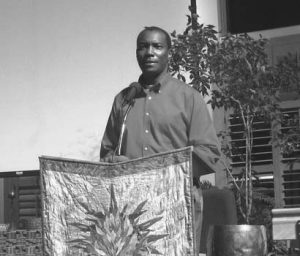Monica Dore, News Editor
Students from across the state gathered at SUNY Oneonta’s second annual SUNY Pride Conference this weekend. Nearly 20 events were held to unite LGBTQ communities from separate campuses with the overall theme being that students need to take care of themselves and others, and to work towards a better future for the SUNY system.
A lunch was held on Saturday in Morris Hall to welcome the keynote speaker of the weekend, who came from Uganda to share his experiences of working with the LGBTQ community. Reverend Mark Kiyimba of the Unitarian Universalist Congregation in Kampala is an LGBTQ advocate and also runs a housing program designed to help anyone whose life has been impacted by HIV. He is the recipient of the 2012 Virginia Uribe Award for Creative Leadership in Human Rights, and his work has been praised by many in the West. In Uganda, however, Kiyimba and other LGBTQ advocates live in fear because of their work.
Community members in Uganda have long viewed homosexuality in a negative light, but in 2009, feelings of homophobia and violence against the gay community increased after the introduction of the Uganda Anti-Homosexuality Act. The act was passed in 2014, although it was revised — lifelong imprisonment is now the maximum sentence for homosexual acts. The original bill had proposed the death penalty.
The original bill made life challenging for anyone who supported a gay person, including landlords who provided housing to homosexuals or medical providers who gave assistance to a known gay man or woman. Parents of a gay child were required to turn that child in, or face years of imprisonment. As of August, however, these provisions were nulled.

Kiyimba is from a church of only 150 members, and the church is one of the only in Uganda to support the LGBTQ cause. The reverend spoke of a young man who had traveled to Kampala to visit the church, only because he did not believe such compassion and support would come from a religious group. The young man had many questions and concerns that had been bothering him since puberty.
“The most important thing he wanted to hear,” said Kiyimba, “is that he can still be a Christian and he can still be a gay-practicing person. Once I said that to him, he thanked me so much, and he left my office.”
Kiyimba said many young LGBTQ Africans who have similar questions receive only hatred from community members, including religious leaders. For many of these Africans, the only resolve is to commit suicide, perform self-abuse or to “hate anything for the future” and lose hope.
Change is something that Reverend Kiyimba says must come from within Uganda, although he believes that Americans should still show support and encourage progress in Uganda. In a past speech, he said that much of the anti-gay sentiment in Uganda has come from American evangelical ministers who have preached hatred in Africa. Because of this, some people believe that America is obligated to help Uganda.
During his brief talk, Reverend Kiyimba expressed gratitude to the SUNY system for allowing him to talk, and added, “I am so proud, and I am so happy, that I’m doing what I’m doing. I am so happy that we have partners in other places, in Oneonta.” He also thanked the SUNY system for its work within the LGBTQ community and for giving students an opportunity to discover themselves.
Courtney D’Allaird, the founding coordinator of University at Albany’s Gender and Sexuality Resource Center, said that between 56,000 and 119,000 students within the SUNY system fall into the category of LGBTQ. For many of these students, college is better than high school, simply because they don’t face every day slurs. Although life has improved for many, there is still a long way to go in Uganda, and right here on our own campus.
Reverend Mark Kiyimba spoke of the progress in America and said that while it is great news for the states, it is important that we remember how people live in other countries. “Sometimes when I travel, and I come to places like this, instead of sometimes being joyful, you know it is human nature, sometimes you feel sad. Because back home, you can’t see the same happening. But I hope,” he said, “that there is a future that is more bright than what is today.”
Leave a Reply